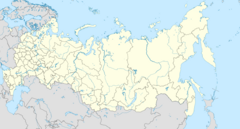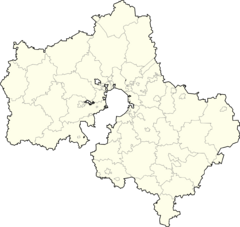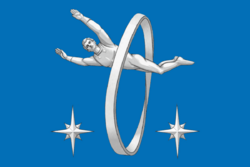Star City, Russia
Topic: Astronomy
 From HandWiki - Reading time: 4 min
From HandWiki - Reading time: 4 min
[ ⚑ ] 55°52′50″N 38°06′38″E / 55.8806°N 38.1105°E
Star City (Russian: Звёздный городок, romanized: Zvyozdny gorodok, lit. 'starry townlet') is a common name of an area in Zvyozdny gorodok, Moscow Oblast, Russia , which has since the 1960s been home to the Yuri Gagarin Cosmonaut Training Center (GCTC). Officially, the area was known as "closed military townlet No. 1" and at various times had also been designated as Shchyolkovo-14 (Щёлково-14) and Zvyozdny (Звёздный).[1]

Overview
Cosmonauts of the Russian Federal Space Agency, and the Soviet space program before it, have lived and trained in Star City since the 1960s. In the Soviet era the location was a highly secret and guarded military installation, access to which was severely restricted. Many Russian cosmonauts, past and present, and Training Centre's personnel, live in Star City with their families. The facility has its own post office, high school, shops, child day care/kindergarten, movie theater, sports and recreation facilities, railway station, and a museum of space travel and human exploration. Air transportation is available through nearby Chkalovsky Air Base.
In the summer 1992, American "Youth Science Ambassadors" sponsored by People to People International were hosted at Star City where they were treated to a presentation by cosmonaut Anatoly Artsebarsky. In the mid- to late 1990s, groups of select students from high school in Star City participated in the Russian American Cultural Exchange Program (RACE). Students first hosted, then visited, American counterparts attending five high schools in the United States .
There is a statue of the "space dog" Laika, the first animal to orbit the Earth, in Star City.
Transportation
Transportation needs are met by the no. 380 bus route and taxis that stop near the border checkpoints, and by a railway station located at a short walking distance.
Incorporation
For most of its history, the space training center was in jurisdiction of the Soviet and then Russian military. However, in August 1996, due to the changes in legislation the center became subordinated both to the Ministry of Defense and to the Roscosmos (Russian Federal Space Agency).[2] This double status remained in effect until October 1, 2008, when the center was re-organized and subordinated directly and solely to the Roscosmos.[2] As a result, the status of the territory of Star City was changed from military to civil, and the territory itself was incorporated as a closed administrative-territorial formation of Zvyozdny gorodok.[3] Within the closed formation, the territory was organized on June 16, 2009 as an inhabited locality with the status of a work settlement.[4] A proposal to officially name the work settlement as Zvyozdny gorodok was submitted to the federal government on October 29, 2009,[1] but as of 2011 has not yet been officially approved.
NASA in Star City
The "Prophylactory" (aka the "Prophy"), was a three-floor dormitory built by the Russians to house Americans during the Apollo–Soyuz Project. NASA leased the second floor for team housing and for the office of the Director of Operations, Russia. NASA also built several duplexes for housing, during the Shuttle-Mir program.[5]
NASA flight surgeon Michael Barratt stated during an oral history interview in 1998, "Star City has always been kind of felt as the forbidden city or the hidden city. It wasn't on any maps, certainly, by then. It was a secret cosmonaut training base. Of course, everyone knew where it was, but it was considered a closed and secure city".[6]
Notable residents
References
- ↑ 1.0 1.1 Московская областная Дума. Постановление №7/94-П от 29 октября 2009 г. «О присвоении наименования "Звёздный городок" географическому объекту в Щёлковском районе Московской области». (Moscow Oblast Duma. Resolution #7/94-P of October 29, 2009 On Granting the Name of "Zvyozdny gorodok" to the Geographical Object in Shchyolkovsky District of Moscow Oblast. ).
- ↑ 2.0 2.1 Official website of Zvyozdny Gorodok Urban Okrug. Historical reference (in Russian)
- ↑ Президент Российской Федерации. Указ №68 от 19 января 2009 г. «О преобразовании закрытого военного городка №1 в закрытое административно-территориальное образование — посёлок Звёздный городок Московской области». Вступил в силу со дня подписания. (President of the Russian Federation. Decree #68 of January 19, 2009 On the Transformation of Closed Military Townlet No. 1 into the Closed Administrative-Territorial Formation—the Settlement of Zvyozdny gorodok of Moscow Oblast. Effective as of the date signed.).
- ↑ Губернатор Московской области. Постановление №74-ПГ от 16 июня 2009 г. «Об образовании посёлка городского типа — рабочего посёлка на территории закрытого военного городка №1, преобразованного в закрытое административно-территориальное образования». (Governor of Moscow Oblast. Resolution #74-PG of June 16, 2009 On Establishing the Urban-Type Settlement—a Work Settlement—on the Territory of Closed Military Townlet No. 1, Which Was Previously Transformed into a Closed Administrative-Territorial Formation. ).
- ↑ NASA history
- ↑ Oral History Michael Barratt
Further reading
- Gray, Nathan (April 15, 2013). "Investment questions for Russia's closed cities". http://themoscownews.com/business/20130415/191440775/Investment-questions-for-Russias-closed-cities.html.
External links
- Gagarin Cosmonauts Training Centre (GCTC)
- Gagarin Cosmonauts Training Centre (GCTC) (in Russian)
- BBC News – Inside Russia's space camp
- BBC News – In pictures: Russian space school
 |
 KSF
KSF


